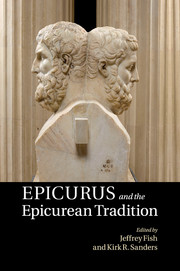Book contents
- Frontmatter
- Contents
- Acknowledgements
- Note on Abbreviations
- List of Contributors
- 1 Introduction
- 2 Autodidact and student: on the relationship of authority and autonomy in Epicurus and the Epicurean tradition
- 3 Epicurus' theological innatism
- 4 Epicurus on the gods
- 5 Not all politicians are Sisyphus: what Roman Epicureans were taught about politics
- 6 Epicurean virtues, Epicurean friendship: Cicero vs the Herculaneum papyri
- 7 Cicero's use and abuse of Epicurean theology
- 8 The necessity of anger in Philodemus' On Anger
- 9 Philodemus, Seneca and Plutarch on anger
- 10 Philodemus and the fear of premature death
- Bibliography
- General index
- Index of passages
8 - The necessity of anger in Philodemus' On Anger
Published online by Cambridge University Press: 01 June 2011
- Frontmatter
- Contents
- Acknowledgements
- Note on Abbreviations
- List of Contributors
- 1 Introduction
- 2 Autodidact and student: on the relationship of authority and autonomy in Epicurus and the Epicurean tradition
- 3 Epicurus' theological innatism
- 4 Epicurus on the gods
- 5 Not all politicians are Sisyphus: what Roman Epicureans were taught about politics
- 6 Epicurean virtues, Epicurean friendship: Cicero vs the Herculaneum papyri
- 7 Cicero's use and abuse of Epicurean theology
- 8 The necessity of anger in Philodemus' On Anger
- 9 Philodemus, Seneca and Plutarch on anger
- 10 Philodemus and the fear of premature death
- Bibliography
- General index
- Index of passages
Summary
Philodemus' On Anger (De ira; = PHerc. 182) ends with a surprise. As he concludes his book, Philodemus tells the reader that the assumption of harm is not a sufficient condition of anger. In response to an opponent, Philodemus argues that just as it does not follow that a person becomes wise if he is literate, so it does not follow that a wise person becomes angry if he assumes that another has harmed him. The assumption of harm is a necessary, but not a sufficient, condition. Just as it is necessary for a person to know his letters if he is wise, so it is necessary for a person to assume harm if he is angry. But just as being literate does not make someone wise, so the mere assumption of harm does not make a wise person angry in every case.
The surprise is this: Philodemus has been claiming all along that anger is inescapable (ἀνέκφευκτος) for human beings. As a general kind (γένος), he asserts, anger is inescapable for everyone. In particular, natural anger is inescapable ‘for the nature of humans’. Consequently, the well-reasoning person will inevitably (πάντως) experience natural anger. Even the wise person will experience some cases of anger. Philodemus has also presented a number of arguments in which the assumption of harm, in cases where harm is inflicted voluntarily, is cited as the reason a wise person gets angry.
- Type
- Chapter
- Information
- Epicurus and the Epicurean Tradition , pp. 152 - 182Publisher: Cambridge University PressPrint publication year: 2011
- 15
- Cited by



